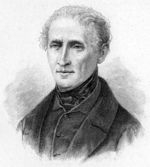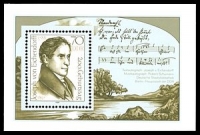| Joseph von Eichendorff | |||||
| yuē sè fū · féng · ài xīng duō fū | |||||
yuèdòuài xīng duō 'ěr fū Joseph Freiherr von Eichendorffzài诗海dezuòpǐn!!! | |||||
艾兴多尔夫是浪漫派作家,他厌恶资本主义制度,对现实不满,向往旧日美好的生活,渴望返回自然,他是德语文学中最优秀的诗人之一。他的诗富有民歌特色,形式质朴,语言明快,基调乐观健康,与一般浪漫派诗人的朦胧、阴郁和神秘的诗不同。他的诗大多写自然景色,《在一个清凉的地方》、《啊,山谷遥远,山峰高高》等,都是脍炙人口的佳作。他的诗对后世诗人如施托姆、李利恩克龙、海塞等有很大影响。
他的长篇小说《预感和现实》(1815)是以歌德的《威廉·迈斯特》为范例写的发展小说,在艺术上不很成功,主要表明作者反对异族侵略,以模糊不清的中世纪的理想来解决现实矛盾的思想。中篇小说《一个无用人的生涯》(1826),写一个农家少年经历了一些近似荒唐的冒险,最后化险为夷,得到意外的幸运的结局。他的“无用人”是指不愿附和现实生活秩序的流浪者,为争取符合人的尊严的生活而斗争,含有深刻的意义。作品中有大量的风景描写和优美的诗歌。中篇小说《迪兰德宫》(1837)写的是法国大革命,批判对贵族的过火行动,歪曲了革命者的形象。此外,他还写过剧本,如《迈耶贝特的兴亡史》(1828)、《求婚者》(1833)。晚年还写了一些学术著作,其中重要的有《十八世纪德国长篇小说同基督教的关系》(1851)、《戏剧史》(1854)、《德国文学史》(1857)。
Eichendorff was born at Schloß Lubowitz near Ratibor in Upper Silesia. His parents were the Prussian officer Adolf Freiherr von Eichendorf and his wife, Karoline Freiin von Kloche, who came from an aristocratic Roman Catholic family. He studied law in Halle (1805-1806) and Heidelberg (1807-1808). In 1808 he travelled through Europe, visiting Paris and Vienna. In 1810, he returned home to help his father run the family estate. The same year he met Johann Gottlieb Fichte, Achim von Arnim, Clemens Brentano, and Heinrich von Kleist in Berlin. He finished his studies in Vienna in 1812. From 1813 to 1815 he fought in the Napoleonic Wars.
From 1816, Eichendorff worked in various capacities in the administrative service of the Prussian state. In 1821, Eichendorff became school inspector in Danzig, in 1824 Oberpräsidialrat in Königsberg. He moved with his family to Berlin in 1831, where he worked for several ministries, until he retired in 1844. Eichendorff died in Neiße, Upper Silesia, in 1857.
Despite a career of rather mundane officialdom, Eichendorff is considered the greatest of the German Romantic lyric poets. His guiding poetic theme was that Man should find happiness in full absorption of the beauties and changing moods of Nature. He also wrote a history of German literature that was posthumously published. Eichendorff's poetry been set by many composers, including Schumann, Mendelssohn, Brahms, Hugo Wolf, Richard Strauss, Friedrich Nietzsche, Hans Pfitzner, and Alexander Zemlinsky.
Aus dem Leben eines Taugenichts – Eichendorff's masterpiece
English title: Life of a Good-For-Nothing.
A typical romantic novella, voyage and love are the main topics. The protagonist leaves his father's mill and becomes gardener on a Viennese castle and falls in love with the supposed daughter of the duke. Because she is unreacheable for him he travels to Italy but then returns and gets to know that she is just adopted by the duke and nothing stands in the way of a marriage between them.
Important works
Stamp of him from the GDR1808 – Die Zauberei im Herbst
1808–1810 – Oberschlesische Märchen und Sagen (Upper Silesian fairytales and sagas)
1815 – Ahnung und Gegenwart
1819 – Das Marmorbild (The Marble Statue)
1826 – Aus dem Leben eines Taugenichts (Life of a Good-For-Nothing)
1833 – Dichter und ihre Gesellen
1833 – Viel Lärmen um nichts
1834 (or 1838) – Auch ich war in Arkadien
1835 – Die Meerfahrt
1837 – Das Schloß Dürande
1839 – Die Entführung
1841 – Die Glücksritter
Geschichte der poetischen Literatur Deutschlands (published 1857)
Libertas und ihre Freier
Notes
Regarding personal names: Freiherr is a title, translated as Baron, not a first or middle name. The female forms are Freifrau and Freiin.


